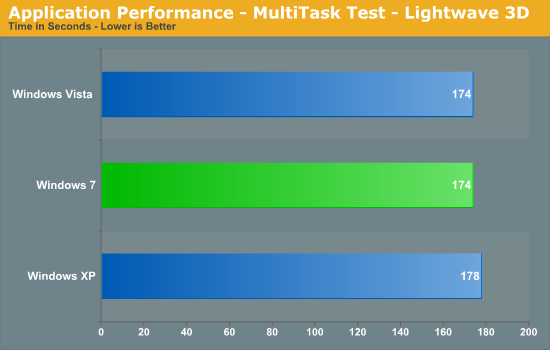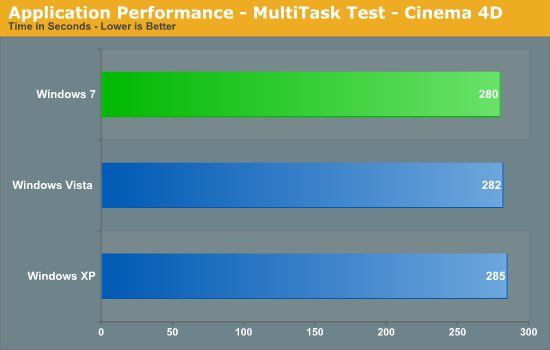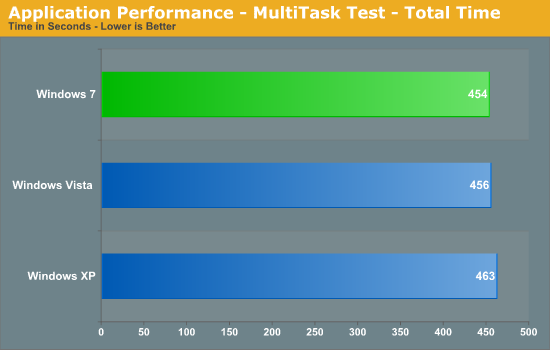Windows 7 Performance Guide
by Ryan Smith and Gary Key on October 26, 2009 12:00 AM EST- Posted in
- Systems
Multitasking
The vast majority of our benchmarks are single task events that utilize anywhere from 23MB up to 1.4GB of memory space during the course of the benchmark. Obviously, this is not enough to fully stress test our 4GB memory configurations. We devised a benchmark that would simulate a typical home workstation and consume as much of the 4GB as possible without crashing the machine.
We start by opening a instance of Internet Explorer 8.0 with six tabs opened to flash intensive websites followed by Adobe Reader 9.1 with a rather large PDF document open, and iTunes 9 blaring the music selection of the day loudly. We then open Lightwave 3D 9.6 with our standard animation, Cinema 4D R11 with the benchmark scene, and Microsoft Word with a few large documents.
We wait two minutes for system activities to idle and then start playing Pinball Wizard via iTunes, start the render scene process in Cinema 4D R11, and then the render frame benchmark in Lightwave 3D. Our maximum memory usage during the benchmark is 3.46GB with 100% CPU utilization across all eight threads.



This a pattern that will repeat itself throughout our benchmarks. In well threaded applications, Windows 7 has a slight advantage over Vista and a larger one over XP. In this particular case, Win7 completes the benchmark nine seconds quicker than XP for a 2% advantage.










207 Comments
View All Comments
MrPete123 - Monday, October 26, 2009 - link
I should also mention that Win7 has a lot more features available to developers such as a biometric and touch screen support. The touch support is already being used by HP on their touchsmart computers.I think the fact that Win7 was such a modest update (compared to the XP to Vista transition) is why its been getting such great reviews. Vista SP2 is a solid OS, and to depart too far from that would be risky.
I used Vista when it first came out and it had terrible disk performance and buggy drivers... I can see why people didn't like it. Since SP1 its been a pretty solid, fast OS. However its never been able to recover its tarnished reputation.
theslug - Monday, October 26, 2009 - link
"On a proper system, Vista has always been the better choice for Windows."Oh really? Why did so many people decide to stick with XP then?
"If you’re not on Windows Vista or Windows 7, you should be. XP has been outdated for quite some time."
XP runs every program I have just fine. Just because it's outdated doesn't mean it can't be used. I'll decide what OS to run on my computer, thx.
strikeback03 - Monday, October 26, 2009 - link
Well, then you really didn't need to read the article for advice, did you?That statement was probably poorly worded, as at Vista launch there were definitely reasons to stick with XP, and I'd guess there are a decent number of people like me, who skipped Vista as by the time SP1 was out, it was known that 7 would be coming soon and not to bother stopping at Vista in between.
fepple - Monday, October 26, 2009 - link
On the laptop page, should that be "second to resume from hibernate"? If not, then I dont think its really that important a statistic, I'd be happy for my Desktop to take twice as long to hibernate, if it resumed in half the time :)drfelip - Monday, October 26, 2009 - link
What about the performance benefit of SSDs under Windows 7? I think this is going to be my next upgrade.Voo - Monday, October 26, 2009 - link
I switched from XP to 7 when I got my free RTM from MSDNA and have been using it since then. Imho the usability improvements (new taskbar, search, that neat window snap stuff,..) and the overall look are really worth the upgrade and I'd buy the retail version anytime.I also took the chance to get a Intel SSD, so I'd have to install the OS in any case.. win/win situation ;)
XP was nice while it lasted, but it shows its age and XP64 was never really up to top, so it was just time to change.
Wolfpup - Monday, October 26, 2009 - link
I have to COMPLETELY disagree about OS X having the better interface. At best, it's personal preference, but I can think of a ton of examples where Windows-even older versions of Windows-have a more logical way of doing things. (Just two examples-it's much easier to create/manage files from Explorer, whereas OS X more forces you to use the program you want, and then save the file out through the program-Windows does either way almost equally well. Another-save dialog boxes in Windows have long had FAR more functionality with being able to manage other files while saving-something I end up making use of near daily.)OS X's font rendering continues to be horrific too, and it STILL doesn't play Blu Rays!
But...I do like the changes made to the task bar on Windows 7, for the most part. It mostly is a "best of both worlds" approach, although it doesn't do EVERYTHING as well as what it's replacing. (I miss the classic Start Menu too, which had more functionality than the new one, but some of the new Taskbar changes help mitigate that.)
I'm glad Anandtech continues to champion UAC. One of the first things I did after installing 7 was to change it back to it's highest setting. I'm baffled by the resistance to it. For one thing, OS X has done THE SAME THING since it's inception-which is a GOOD thing. For another, you don't see it very often, and we should all want that extra layer of security.
I've seen a self professed "computer expert" going on about how *HE* doesn't need UAC-and completely not getting it that we probably benefit MORE from it than the average user, since we know if something we're doing would need to have prompted that. He wasn't getting it that it's a protection from malware, etc.
danielkza - Monday, October 26, 2009 - link
I have to confess, even tough I like the UAC idea, I could not stand it in Vista: the protection did not make up for the annoyance.But I've been using it in Windows 7 since January, and I have no complaints whatsoever: being a power user, knowing what the (tons of) diff. programs are up to is incredibly helpful.
Pastuch - Monday, October 26, 2009 - link
I completely disagree with a lot of the conclusions in this article. I think Anandtech is a little blind to the performance benefits of Windows 7 over Windows Vista because all the equipment they use for testing is brand new and high end. The bulk of laptop users have machines that cost $800 or less. In the last year Netbook sales and lower end laptops have become the norm. This review completely ignores those changes in the market place. I have installed Windows 7 on lots of lower end laptops that previously had Vista and in 100 percent of the cases the users have commented on how much faster Windows 7 feels.If your an HTPC user then Windows 7 is a must IMHO. I've been using 7 since January and I have yet to see a BSOD. I definitely can't say the same for my Vista machine (it's 7 now too).
The0ne - Monday, October 26, 2009 - link
I agree, I think this article is incomplete for the most part. As I commented on the 2nd page Tom's hardware does have some sort of test for this. I don't know because I only read the conclusion. They seem to be in agreement with us about Windows 7 being good on older PCs, especially laptops.I've converted many laptops as well and they are definitely running better with Windows 7.